there is actually a few things in that article which is believable.
The part important here is that Cambricon has been around longer than some of the other AI chip designers so their software is likely better. They've also had more time to work with AI labs, especially bigger players like ByteDance and Tencent.Between 2020 and 2024, Cambricon invested Rmb5.6bn in research and development, which it ploughed into software improvements to make it easier to deploy models originally trained on Nvidia’s GPUs to run on its rival Siyuan chips. Several people, including a ByteDance AI engineer, said Cambricon’s software compatibility made its products easier to use than Huawei’s Ascend. “Cambricon struggled to gain traction until the end of 2024, when it collaborated with ByteDance to make its chip more compatible with algorithms trained on Nvidia’s ecosystem,” said Lin Qingyuan, semiconductor analyst at Bernstein.
Keep in mind that ByteDance was against working with Huawei for a long time but also needed a domestic chip option.
yes, this is trueMany of China’s leading purchasers of AI chips, including China Telecom, Alibaba, Tencent, and Baidu, also compete with Huawei in other businesses, such as network equipment, cloud computing, and self-driving cars, creating a strong incentive for them to support alternatives to the sprawling tech conglomerate.
most of its sales is to ByteDance, but keep in mind that Nvidia gets 40% of its revenue from 2 customers. So this is not abnormalCambricon has struggled to meet demand after selling most of its chips in the first quarter to internet giant ByteDance, according to two people familiar with the matter, including one executive at the internet giant.
Interesting to hear this from Inspur since they are in charge of building the servers that customers use.“Our customers have a very high rating for its products after testing,” said one salesperson at Inspur, one of China’s biggest data centre assemblers. “There just isn’t enough supply.”

